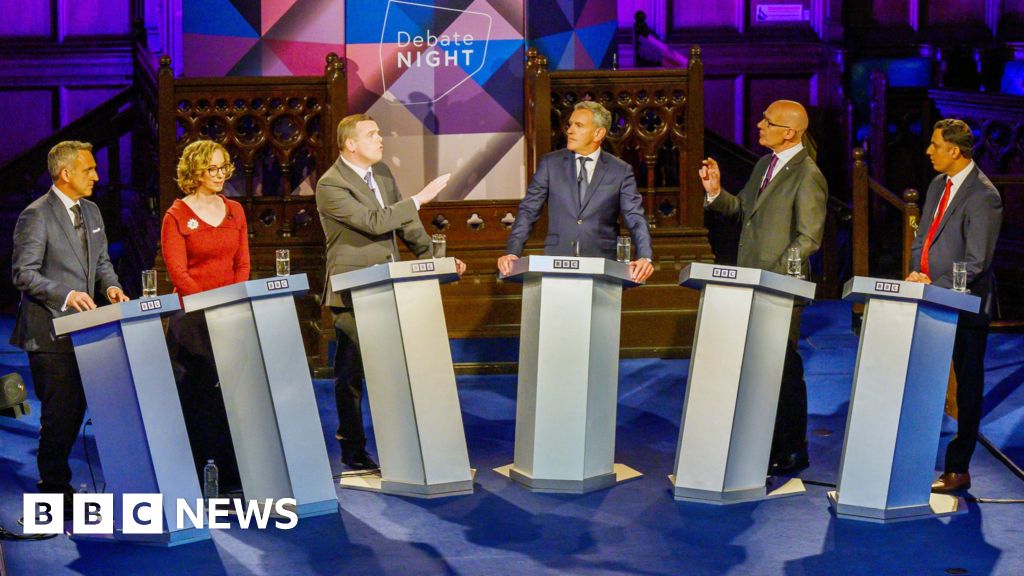World
Scottish parties leaders clash on cost-of-livng and NHS in BBC debate – BBC News

- Author, Megan Bonar
- Role, BBC Scotland News
The leaders of Scotland’s larger political parties have gone head-to-head on the cost-of-living crisis and NHS waiting times during a BBC Scotland debate.
First Minister John Swinney accused Labour and the Conservatives of “not being straight with voters” about £18bn of spending cuts.
Scottish Labour leader Anas Sarwar said there will be “unequivocally no austerity under a Labour government”.
Douglas Ross, the Scottish Conservative leader, said his party will further cut National Insurance.
The party leaders were questioned by members of the public on a wide range of issues during a BBC Scotland Debate Night leaders’ special in Glasgow.
In a heated exchange on what their parties would do to help working class families navigate the cost-of-living crisis, SNP leader John Swinney said the economic research group the Institute for Fiscal Studies (IFS) has warned of £18bn of public spending cuts which would follow the election of either a Conservative or Labour government.
He said neither party is being honest with the public and accused Labour of “signing up” to cuts “by accepting the fiscal constraints of the Tories”.
Mr Swinney said there is a “fixed sum” of money available to the Scottish government but said “tough decisions” by ministers at Holyrood to increase taxes had made more cash available for services.
He said his party had helped working class families by introducing the Scottish Child Payment and scrapping school meal debt.
“That is the reality people are facing in this election – austerity from the Tories or austerity from the Labour Party,” he said.
Mr Sarwar told him: “Read my lips. No austerity under Labour.”
He said there would be “unequivocally” no austerity under a UK Labour government and said his party would “make work pay” by ensuring pay rose for more than 200,000 people in Scotland.
The Scottish Labour leader hit out at the UK Conservative government for the “carnage the Conservatives have imposed on this country and the state of the public finances”.
Mr Sarwar went on to say that the election was a chance to oust the Tories from power.
Both the SNP and the Conservatives oppose Labour’s plans for a windfall tax on the energy industry.
Douglas Ross warned it could lead to the loss of 100,000 jobs, a claim which has also been made by the SNP.
BBC Verify has previously concluded this claim was misleading.
Mr Ross said his party would help tackle the cost-of-living crisis by cutting national insurance by a further 2p, a policy announced in the Conservative manifesto on Tuesday.
The co-leader of the Scottish Greens, Lorna Slater, said the rich had “made off like bandits” during the pandemic, and reaffirmed her party’s commitment to taxing the “super-wealthy”, which she classified as those with over £3.4m worth of assets.
The Greens also back a windfall tax on oil and gas giants.
Alex Cole-Hamilton, leader of the Scottish Liberal Democrats, said his party would “immediately reverse” the two-child cap on benefits and invest in public services to grow the economy by helping people – such as the 175,000 Scots with long Covid -back into work.
On the topic of the NHS, John Swinney said the health service is under “acute pressure” as a consequence of increased demand and a falling population due to Brexit.
He said Labour would invest less in the NHS during their first year in power than the Conservatives.
“That shows you that the Labour Party is not committed to delivering the type of investment to end austerity which is what is required in this country,” he said.
Mr Sarwar said his party will put an immediate injection of cash into the NHS by closing the non-dom tax loophole to fund 160,000 appointments in Scotland every year.
Mr Cole-Hamilton complained it was “hard” for people to get GP appointments.
He said Scotland is dealing with a “mental health crisis” and his party would fix this by trebling the digital services tax which is paid by social media giants such as Facebook and Instagram and using the funds generated to improve mental health care.
Ms Slater blamed the problem on the “tiny packet of money” the Scottish government receives from Westminster in the form of the block grant.
She said this forced government ministers to make “impossible” decisions on how the money should be spent.
The leaders were also quizzed on the topic of Scottish independence.
Mr Swinney said: “People in this country have a democratic right to decide if they wish to be independent.”
And he said even if the SNP lost in the election the party would continue to make the case for leaving the UK.
“The SNP is a party which believes in Scottish independence. If we accept a continuation of the UK Government in Scotland we are signing up to more austerity,” he said.
Ms Slater pressed Mr Sarwar to commit a Labour government to allow another referendum.
“You said it yourself, it’s for the people of Scotland to decide, so will you respect our democratic mandate and allow us a referendum on independence?” she asked.
Mr Sarwar said he did not support independence but understood why some Scots did.
Mr Ross said there had been a “decade of division” in Scotland since the independence referendum in 2014.
He insisted independence was “the obsession of the nationalists”, adding: “It’s not the NHS, not the education system, it’s not carers.
“It’s going to be independence above everything else and Scotland will suffer as a result of that. We can do so much better.”
Mr Cole-Hamilton added the independence debate has “been holding us back” and is not what people on the doorsteps are asking about.
He said issues such as the economy and health are “crying out for ministerial attention but are being starved of that because of the constitutional debate that has gripped our politics for so long.”






